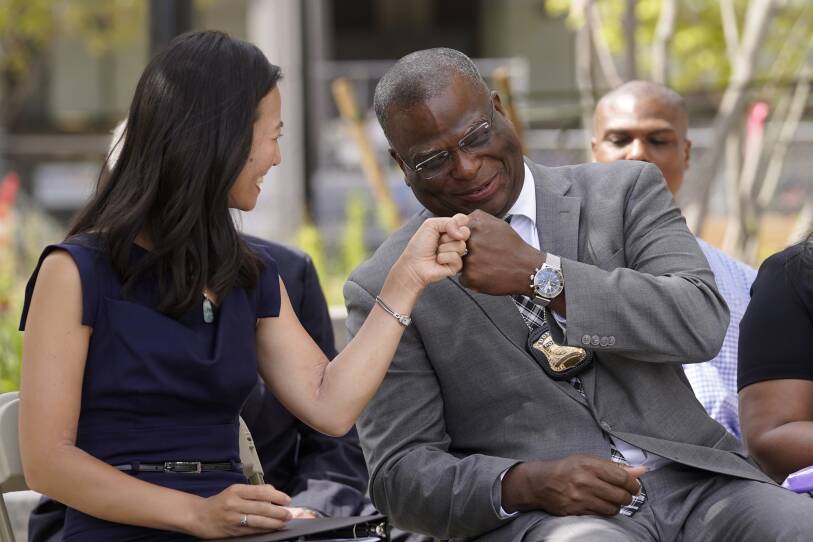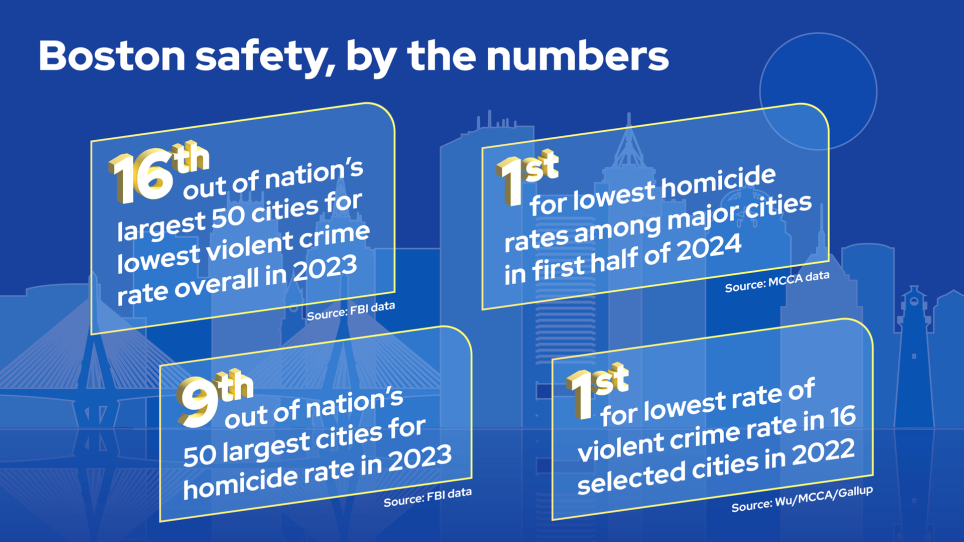Over the past year, Mayor Michelle Wu has spoken with striking confidence about public safety in Boston.
“Across the country, cities look to Boston as the leading light on community safety.” ( Jan. 9, State of the City address)
“It’s clear that Boston is one of, if not the safest city in America.” (March 22, NBC10)
"We’re really proud that Boston is the safest major city in the country." (June 10, Boston Globe)
"We continue to make sure we are doing our part to make sure Boston remains the safest city in America." (Sept. 9, NBC10)
If those claims sound familiar, it could be because they echo assertions then-Mayor Marty Walsh made back in 2017 as he ran for reelection — at least, until GBH News noted that data from the Federal Bureau of Investigation told a more ambiguous story.
Which raises a question: Does the idea that Boston is America’s safest city, or its safest big city, pass muster now in a way it didn’t under Walsh’s watch?
The answer is: not necessarily. National data on violent crimes do indicate that Boston is safer than many comparable communities — and even that, at one point this year, calling it the “safest” may have been defensible. But those same reports, which comprise different cross-sections of communities and contain ever-shifting data, also suggest that labeling Boston “the safest major city in the country” is an oversimplification at best.
Wu, who’s expected to seek a second term in 2025, stood by her characterization in a recent interview with GBH News. She described Boston, once again, as “the safest major city in the country.” And she cited one specific piece of evidence to support her claim: homicide rates drawn from a mid-2024 violent crime report from the Major Cities Chiefs Association.
“If you look across all [the cities] they track — not just the ones that are sort of close in size to us — Boston homicides, as of the midpoint through the year, as an absolute number, were the lowest of any city on that list,” Wu said of the report. “And when you scale it per capita, we’re by far the lowest.”
That’s true. The report, which had data through June 30, showed Boston with just four homicides — far below the city’s total of 18 at the same time last year. Mesa, Arizona, was the city with the next-lowest total number of homicides, with six. But because Mesa is a smaller city, Mesa’s homicide rate per 100,000 residents was 1.16, compared to just 0.62 per 100,000 residents for Boston.

Numbers change over time, and not always for the better
There’s a risk, though, in drawing broad conclusions about safety in one community based on one metric at one moment in time.
Since the MCCA’s midyear report was released, police data show how the picture has already changed.
Boston’s homicide tally — though still lower than the 30 at this time last year — has risen substantially. It now stands at 16, for a homicide rate per 100,000 residents of 2.49. Mesa’s total has increased as well, but at a slower pace. That city now has 11 homicides on the books in 2024, yielding a homicide rate of 2.13 — lower than Boston’s, though not by much. (One notable qualifier: Mesa’s tally does not include four people killed by police in that city this year. Boston hasn’t had a fatal officer-involved shooting since 2022.)
Asked if this comparative shift changes the mayor’s assessment of Boston as the safest major city in the country, a Wu spokesperson replied: “The mayor goes off of the most recent official numbers we have in Boston.”
Last year’s figures don’t make Boston look quite as good. According to newly released FBI data, Boston’s murder rate per 100,000 residents of 5.29 was lower than most of the nation’s 50 largest cities in 2023. Still, eight other cities had even lower rates, including New York City (4.22) and Honolulu (0.61).
How does Boston fare when it comes to all violent crime?
Murder isn’t the only metric to evaluate safety.
Last year, Gallup asked people if they thought 16 different cities were “safe to live in or visit.” Boston ranked second in that poll of public perception. Wu responded by digging into the data. She compared Boston’s rate of all violent crime incidents in 2022 — homicide, rape, robbery and aggravated assault — to the other named cities in that survey, using data from another MCCA report. She found that Boston’s violent crime rate was the lowest of the bunch, a conclusion GBH News validated.
But that Gallup poll and Wu’s analysis excluded dozens of major U.S. cities. Comparing across different cities and different timeframes brings different conclusions.

In the FBI’s newly released 2023 crime data, for example, Boston ranks 16th safest of the nation’s 50 largest cities when it comes to total violent crime, with a rate a bit higher than Chicago and significantly above cities including Honolulu and Mesa.
“If you’re talking about murder specifically, Boston tends to be on the lower end in terms of murder rate,” said Jeff Asher, the cofounder of the crime-analysis firm AH Datalytics. “If you’re talking violent crime, Boston still tends to be on the lower end, but maybe more in the middle. If you define big cities as cities of 250,000 or more, Boston is not at the bottom of the list.”
It’s all about the messaging
When The Economist recently ran a story describing Boston as America’s safest big city, that characterization was partly based on Asher’s firm’s data and analyses. But Asher said he’s leery of using snapshots of crime data to draw emphatic conclusions like The Economist did.
“I would argue that it’s sufficiently good to say, ‘Hey, a city is ... safe relative to national averages, safe relative to other big cities,’” Asher said. “[The question of] ‘Is it the safest or is it the 20th safest based on murder rates?’ is almost arbitrary, I would argue.”
Other criminologists share that reticence.
Ernesto Lopez, the senior research specialist at the Council on Criminal Justice, was the lead author on a recent report that shows Boston with a June aggravated assault rate lower than twelve communities but higher than seven others, including Austin, Omaha and St. Paul.
“Safety can mean a lot of different things,” he said.
Lopez notes that public perception of safety is not always based on statistics. According to new research from the MacArthur Foundation, a wide range of factors can shape whether the residents of a particular place consider it safe, from the level of trust in the legal system to the prevalence of visible drug use.
“It’s not just homicide, and it’s not necessarily even just crime or violent crime as well,” Lopez said. “Personally, I’m not a huge fan of language like, ‘[This is] the safest city, or ‘This is the worst city.’”
Clearly, Wu feels differently. She believes that touting Boston’s track record on safety sends an important message — namely, that her administration’s aggressive, holistic push to both prevent and respond to violence is working.
“This isn’t about patting anyone on the back or giving out trophies,” Wu said. “This is a recognition that this is among the most important work that the city could be doing, and our intentional, sustained efforts have resulted in progress across the entire community.
“We have seen remarkable declines in some of the most important metrics that we track,” Wu added. “And especially when put up against our peer cities, that has been a sustained trend. We are never going to be satisfied and won’t let up, when we know that there’s still trauma and intensive violence across the city to be addressed, prevented. And we are working hard at that every single day.”
Still, speaking about progress in terms of superlatives is a dicey business. At any moment, a particular data point could suggest that Boston is the safest big city in the country — or that it isn’t.
There’s another option: describing Boston as an especially safe city, or a safer city than most of its peers. Those characterizations aren’t as punchy as phrases like “safest city in America,” but they’re likely to hold up to whatever twists the future brings. That’s a good thing for Bostonians. In the end, it may be all they really need to hear.









